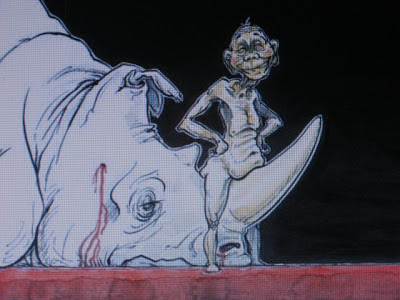Tuesday, January 8, 2013
Poaching blights Namibia as Chinese scramble for rhino-elephant ivory, lion bones and rare Carmine birds
Conservationists fear the worst for Namibia’s biodiversity as a new secretive multi-million dollar poaching phenomenon has reared its ugly head, opening up markets for ivory, lion bones and rare bird feathers, reportedly smuggled to East Asia.
Poaching in the northeast is apparently inflamed by the alleged advent of Chinese construction workers and businessmen in the region.
Conservationist are astounded how Namibia, and to a certain extent its neighbours Angola, Zambia and Botswana are losing wildlife species already on the brink of extinction.
In September alone, a total of 20 elephant carcasses, from which ivory was illegally removed, were stumbled upon in several parks in the Caprivi. Conservationists have also reported lions poached for their bones and skins, found during patrols.
The lion body parts and bones are reportedly used for religious and medicinal purposes in Asia. In the Nkasa, Luipala and Salambala conservancies lions are reportedly killed, skinned and deboned.
Conservation sources also claim the escalation of poaching of elephants, hippos and the Carmine bee-eating birds, the latter trapped for their feathers for ceremonial purposes in China.
A 3 500-strong colony of Carmines, known for breeding on riverbanks in Caprivi, is said to have been wiped out in a single night.
Parks and Wildlife Management Deputy Director Colgar Sikopo said so far they are only aware of elephant poaching and that no poaching of lions and other species was reported.
He said the ministry is not aware of the involvement of Chinese nationals, but the investigation into poaching still continues.
Local sources are pointing fingers at Chinese nationals who are reportedly buying anything that they deem of value. In the Kavango region, destitute subsistence farmers are allegedly encouraged to catch snakes for Chinese construction workers at Divundu.
The situation is said to be precarious for the lives of game wardens, tour operators and lodge owners whose livelihood depend on the unspoilt and abundant wildlife.
The Namibia Defence Force (NDF) has recently sent a small contingent to Babwata to assist in the investigation of poaching in the region.
However, their efforts is said to be up against a culture of fear, especially in the Caprivi, where secrecy is fostered among the inhabitants around the wholesale slaughter of elephants. The NDF did not comment by the time of going to print.
Conservationists are said to have little faith in the success of the NDF assistance, claiming that the soldiers themselves are frustrated by the lack of co-operation, control and absence of anti-poaching measures in Zambia and Angola.
Poaching in Africa, more so in South Africa and Cameroon, has escalated since last year and about 1 500 elephants and rhinos have been killed for ivory and horns respectively.
Source: Informate.com.na
Subscribe to:
Post Comments (Atom)

Unless people speak up, nothing will change. Even a simple thing like sending a letter to concerned minister let them know that people are watching. This is not the time to tolerate inaction.
ReplyDeleteHi, I live in the Caprivi Region and I can confirm that Elephants where killed. Mainly in the Mudumu NP and Bwabwata NP, few cases only on the Mamili (Nkasa Lupala) border.
ReplyDeleteAt this stage I did not here any report on lions killed from poaching.
Don't forget pangolins. Chinese are looking for them also!!
Hi, Please don't forget to mention the efforts made by Community Game Gaurds in the Caprivi. There is a huge calloboration going on at the moment between ministries, conservancies, police, NGO's, resarchers and stakeholders to stop this.
ReplyDeleteneedless to say there are losses, and alarming ones so it's great to see this talked about.
Note of correction though: "Nkasa Lupala" is a Park, not a Conservancy and the elephant oaching is widepread.